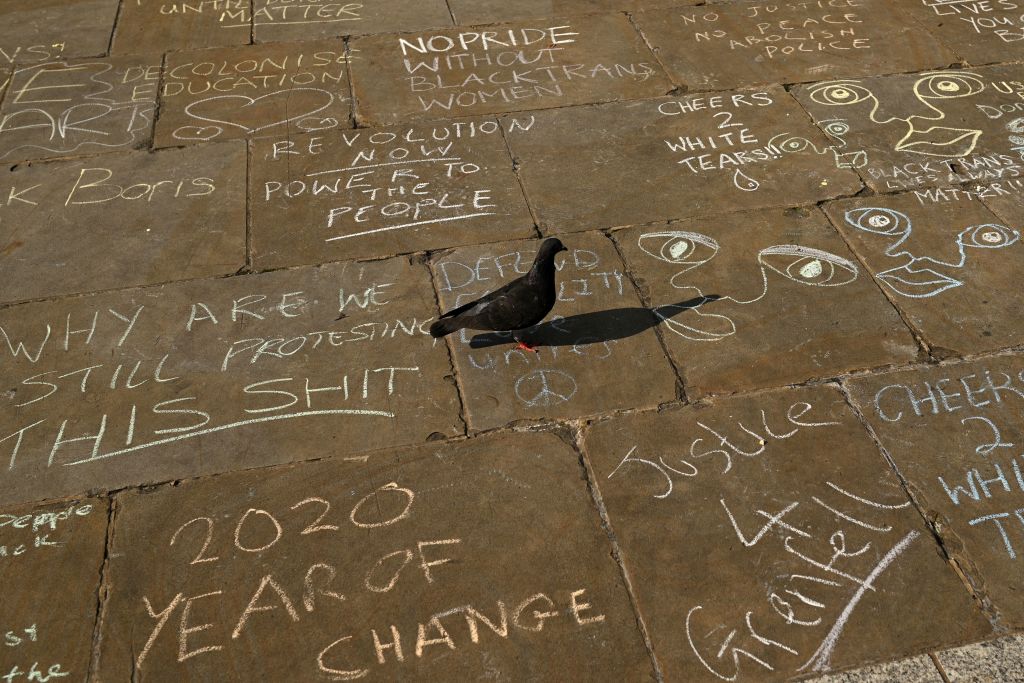The effect of George Floyd’s death in Minnesota upon Britain has been remarkable. We have had waves of protests, in London but also other large British cities, that look set to continue. Statues have fallen; long-loved television shows have been removed from digital platforms. An assumption has been made by many that the protests have at the very least been necessary. But there is a question few are actually asking about the Black Lives Matter protests in Britain: what do the protestors actually want?
Some will say the answer is obvious. The protests are about ending racial inequality in Britain. If so, how do the BLM protests seek to correct this problem in real, practical terms? Think about other large protests from the past that linger in the memory. The Poll Tax demonstrations; Stop the War protests before and during the Iraq War; the People’s Vote marches. It is easy to identify the basic objectives of each of these movements. If a government had been overwhelmingly convinced by the protests to act in each of these three cases, they would immediately know what to do next. Stop charging a tax. Don’t invade a foreign country. Hold a second EU referendum.
But what is the Black Lives Matter equivalent? If at a cabinet meeting Boris Johnson said the government must accede to the wishes of the BLM protestors as soon as possible, what exactly would that entail, even in the broadest terms? Related to this: if we had a Labour government in place at the moment, how would it grant the protestors their demands?
Last year in the US, 1,536 people were killed by police. In the UK, three people were killed. We do not have a major problem with people of any colour being routinely killed by cops in this country. We broadly have policing by consent. Having said that, I am willing to believe that there are race specific problems that make life harder for BAME people and that these should be addressed. (Incidentally, I use the words ‘willing to believe’ not as way of being passive-aggressively doubtful; I as a middle-aged white man cannot know what it is like to be a black teenager in the UK today. I can’t speak for how often I feel targeted by the police for my skin colour or how having an African surname seems to make getting jobs more difficult since those factors do not apply to me.) But I have seen almost no discussion of any substantial policy issues either at the protests or in subsequent dialogue about them. The discussion since the first protest has been as if racism is something being broadcast via a transmitter controlled by the government and all we have to do is get them to shut the thing off.
I believe that one of the reasons we’ve got stuck talking about statues and old TV programmes is because the demands of the protestors have been so vague. Individuals and companies clearly want to do something to satisfy the demands of the protestors without understanding in the slightest what those demands actually are. Some might respond to this by saying that even if there are no solid demands at present, the protests are still a necessary thing. They might say the marches are raising awareness of race issues and that is going to help racial relations in the UK and hopefully make life easier for BAME individuals. Except, that sure doesn’t feel like what is happening at the moment. It hasn’t suddenly got easier to talk about race, racism and related issues – it has suddenly got much, much more difficult. Sometimes in this debate, people talk about racists or racism as if there was an unchangeable amount of them/it in the country and the only way to make the country less racist is to crush dissent. But this is nonsense: people can be persuaded on all sorts of things, race relations amongst them. For instance, a lot of people on the liberal left like to argue that Leave winning the 2016 EU referendum caused racism to spike in the UK. Putting aside whether this true or not, surely if you believe this to be the case you must by definition believe that external factors can make society more or less racist than it had been?
I understand why the first protest happened in the wake of the horrific video of Floyd’s killing going viral. And I am not arguing that we don’t have problems with racism in this country, or that the problems specifically faced by young BAME people trying to get on in life aren’t real. I’m simply questioning whether continuing to take to the streets in protest, with only the vaguest idea of what is being protested or asked for, is really the best method for making things better. I’ve asked a lot of questions in this article but I need to end it with one final one for BLM protestors: how can you succeed at something if you can’t begin to define what success looks like?







Comments